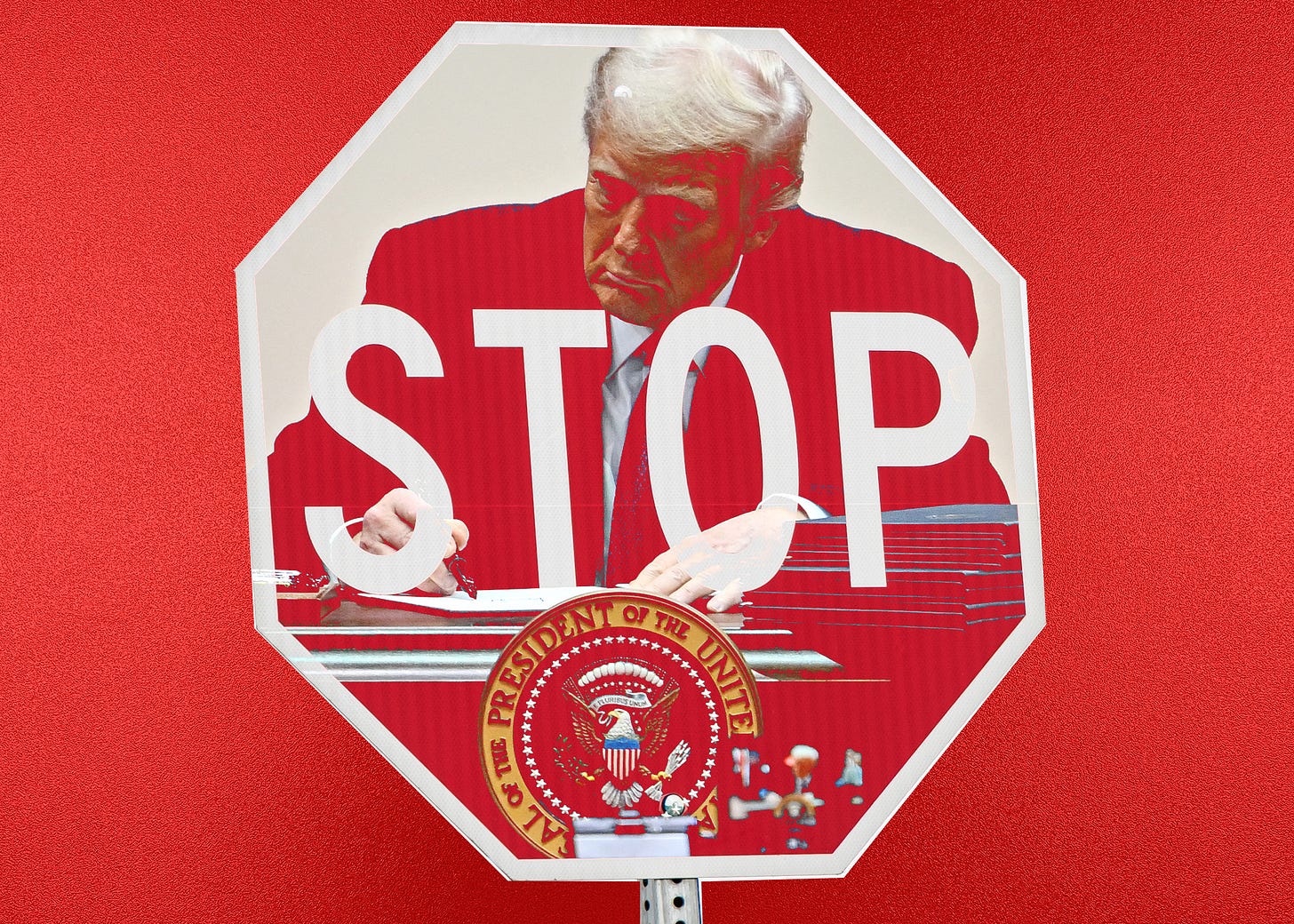For reasons I can’t explain, this entire newsletter feels like it was written in ALL CAPS. So maybe you’ll imagine me shouting it at you, like a crazy person.
Because basically, that’s how I feel right now: Like a crazy person. Maybe you do, too? I dunno
But as Charlie always said: You are not the crazy ones. I think we need to hold on to that now, more than ever.
1. Not Rocket Science
I gave you the stupidest possible headline today, but only because I couldn’t think of a less dumb way to say the most obvious thing in the world. Stopping Trump’s war on America isn’t like solving Fermat’s Last Theorem. It’s actually quite simple.
Right now Donald Trump is here:
He needs to be pushed down to here:
At -1.6 unfavorable, Trump is a juggernaut. At -18 unfavorable, Trump is weak.
Pushing him to -18 is Democrats’ job. Their entire job. In fact, I’m not sure that anything else they do over the next year even matters.
Sitting at -1.6 net unfavorable is basically the most popular Donald Trump has ever been. Which means that congressional Republicans view crossing him as unthinkable. It was hard for Republicans to vote against Trump even at his nadir. At his peak? Good luck finding four Republican senators willing to say no to Tulsi Gabbard and/or Robert F. Kennedy Jr.
In a month or so House Republicans will start considering Trump’s big, beautiful budget/debt-ceiling/immigration/omnibus-everything bill. The higher his approval rating is, the harder it will be for three Republicans to vote against it.
And at the risk of stating even more obvious things: The more painful the legislative process is for Trump on his Everything App, the worse it will be for his popularity. So making it easier for Republicans to defect on his budget bill now will make him less popular later.
But that’s just the legislative side.
Trump is going to be in and out of court constantly in the coming months as his executive orders are litigated. At least some of these EOs are going to wind up at the Supreme Court. And if you think the Court isn’t influenced by perceptions of presidential popularity and legitimacy on such matters, then I have a wallet full of $Barron coins to sell you.
As John Roberts ponders the fate of birthright citizenship, he will absolutely be paying attention to how popular Trump is. Because Roberts will be basing his decision on the future legitimacy of the Court and he will be more reluctant to push all-in against Trump at -1.6 unfavorable than he will be at -18 unfavorable.
That’s just reality.
Another reality is that the salience of issues largely depends on the president’s perceived favorability. Do people care about the price of eggs? Well, if the president is popular and egg prices are high, then everyone assumes that the public doesn’t care about the price of eggs. And because people assume that, they don’t talk about it.
But if the price of eggs is high and the president is unpopular, then people won’t shut about how terrible it is that egg prices are off the charts.
Perhaps you remember this dynamic?
When a president is popular, nothing sticks and nothing matters. When a president is unpopular, every stupid, random thing is a catastrophe they have to answer for.
2. The Good News
Because graphic design is my passion I created this chart showing Trump’s approval rating from 2017 until today and then tried to interpret the data in a way elected Democrats might be able to understand.
You will note that over the course of eight years Donald Trump has been at his current level of relative popularity only twice. The normal state of affairs for Trump has been a net unfavorable level of roughly -13.
Which means that we’re not trying to argue people into buying sunscreen during a blizzard. People don’t like the guy. They’re used to not liking the guy.
So here’s an idea: Go out and tell them about the bad shit Trump is doing, right now. I am not a Democratic strategist, but for instance:
You may remember Robert Keith Packer. He was wearing the Camp Auschwitz hoodie during the insurrection. This very fine person:
He was convicted of crimes he committed on January 6th. Donald Trump just pardoned him.
Then there’s David Dempsey. He was the guy throwing up White Power signs while hitting cops with bear spray and flagpoles on January 6th. This wasn’t a one-time thing for him. He’d been convicted of assaulting peaceful anti-Trump protesters back in 2019.
Dempsey was sentenced to 20 years for his January 6th crimes. Trump just let him off the hook.
Video of Dempsey ought to be everywhere. He should be the face of these pardons. Normie voters should not be able to hear the words “Trump” and “pardons” without picturing this scumbag’s face.
And let’s talk about Ross Ulbricht, whom Trump pardoned this morning.
Ulbricht was serving a double-life sentence, plus 40 years, without the possibility of parole. Why? Because he founded Silk Road, which was basically the Dark Web’s eBay.
Silk Road was a marketplace where criminals sold and bought drugs, hacking services, and malware. And also contract killings. (One of the reasons Ulbricht’s sentence was so severe was because the judge found that he had allegedly contracted to have five people killed.1)
Donald Trump has called for the death penalty for drug dealers—yet Ulbricht’s Silk Road created thousands of drug deals and helped drug dealers launder their money.2
Why is Trump soft on drug dealers!?!?
Hang this guy—hang all of these guys—around Trump’s neck like a garlic necklace.
And if that doesn’t work, then find something that does. You have one job: Make line go from low to high.
3. This Guy
Wired wrote the definitive story on Ulbricht and Silk Road.
He peeked through the front window and caught a glimpse of the postman hurrying off. The guy was wearing a US Postal Service jacket, but with sneakers and jeans. Weird, Green thought. Also odd was a van Green noticed across the street, one he’d never seen before: white, with no logos or rear windows.
Green opened the door. It was winter, a day of high clouds and low sun. A pale haze washed out the white-tipped Spanish Fork Peak rising above the valley. Green looked down. On the porch sat a Priority box—about Bible-sized. His little dogs watched him pick up the mystery package. It was heavy, had no return address, and bore a postmark from Maryland.
Green considered the package and then took it into his kitchen, where he tore it open with scissors, sending up a plume of white powder that covered his face and numbed his tongue. Just then the front door burst open, knocked off its hinges by a SWAT team wielding a battering ram. Quickly the house was flooded by cops in riot gear and black masks, weapons at the ready. There was Green, covered in cocaine and flanked by two Chihuahuas. “On the floor!” someone yelled. Green dropped the package where he stood. When he tried to comfort his pups, a dozen guns took aim: “Keep your hands where we can see them!”
Officers cuffed Green on the floor while fending off Max, the older Chihuahua, who bared his tiny fangs and bit at their shoelaces. Splayed out on the carpet, Green was eye level with dozens of boots: A large tactical team—SWAT and DEA agents—fanned out through the house. He could hear things crashing, some officers yelling, others whispering to each other. He looked at the busted door and thought, Man, that thing was unlocked. On the living room wall hung family photos—his wife, Tonya, their two daughters, and a grandson—smiling brightly above Green, lying amid $27,000 worth of premium flake. (The package was stamped with a red dragon, the symbol for high-quality Peruvian.) Over the whole scene was a needlepoint that said: if i had known you were coming, i would have cleaned up! Excited by the company, little Max stopped shaking just long enough to crap right in the living room.
The fact was, Green wasn’t just your average Mormon grandpa. Over the past few months he had been handling customer service for the massive online enterprise called Silk Road. It was like a clandestine eBay, a digital marketplace for illicit trade, mostly drugs. Green, under the handle Chronicpain, had parlayed his extensive personal narcotics knowledge—he’d been on pain meds for years—into a paying gig working for the site. Silk Road was hidden in the so-called dark web, a part of the Internet that’s invisible to search engines like Google. To access Silk Road you needed special cryptographic software. Combining an anonymous interface with traceless payments in the digital currency bitcoin, the site allowed thousands of drug dealers and nearly 1 million eager worldwide customers to find each other—and their drugs of choice—in the familiar realm of ecommerce. For a brief time, from 2011 to 2013, it was a wild success. In that relatively short span, Silk Road managed to rack up (depending on how you count) more than $1 billion in sales.
Which is why Green found himself surrounded by an interagency task force. He had been hired by Dread Pirate Roberts, the mysterious figure at the center of Silk Road.
The wording on this is weird because the contract killings were not part of the charges against Ulbricht, and no killings took place—but the alleged attempted contracts were taken into account by the judge at sentencing.
Ulbricht is a libertarian hero precisely because he made it easier for people to buy drugs. Trump is an anti-drug hardliner. This seems like a tension that should be exploited.








If you're looking for things to hang around Trump's neck, how about his executive order rescinding the cap on prescription drug prices? (See WaPo roundup of executive orders from yesterday.) Who's for that? And yet it's slipped under the radar.
I always read your articles in my head like you're shouting at me like a crazy person, after having broken through the wall Kool-Aid Man style.